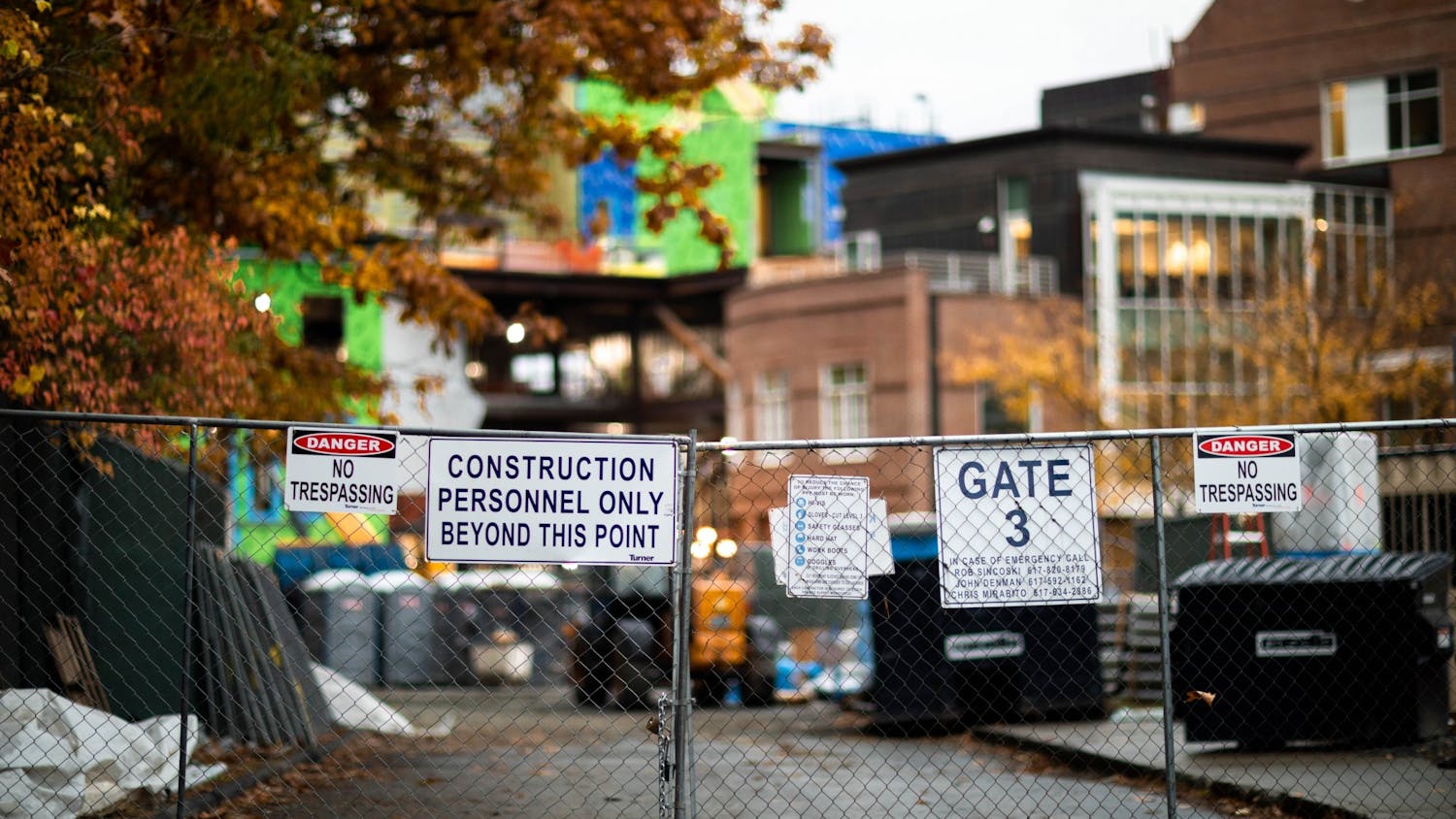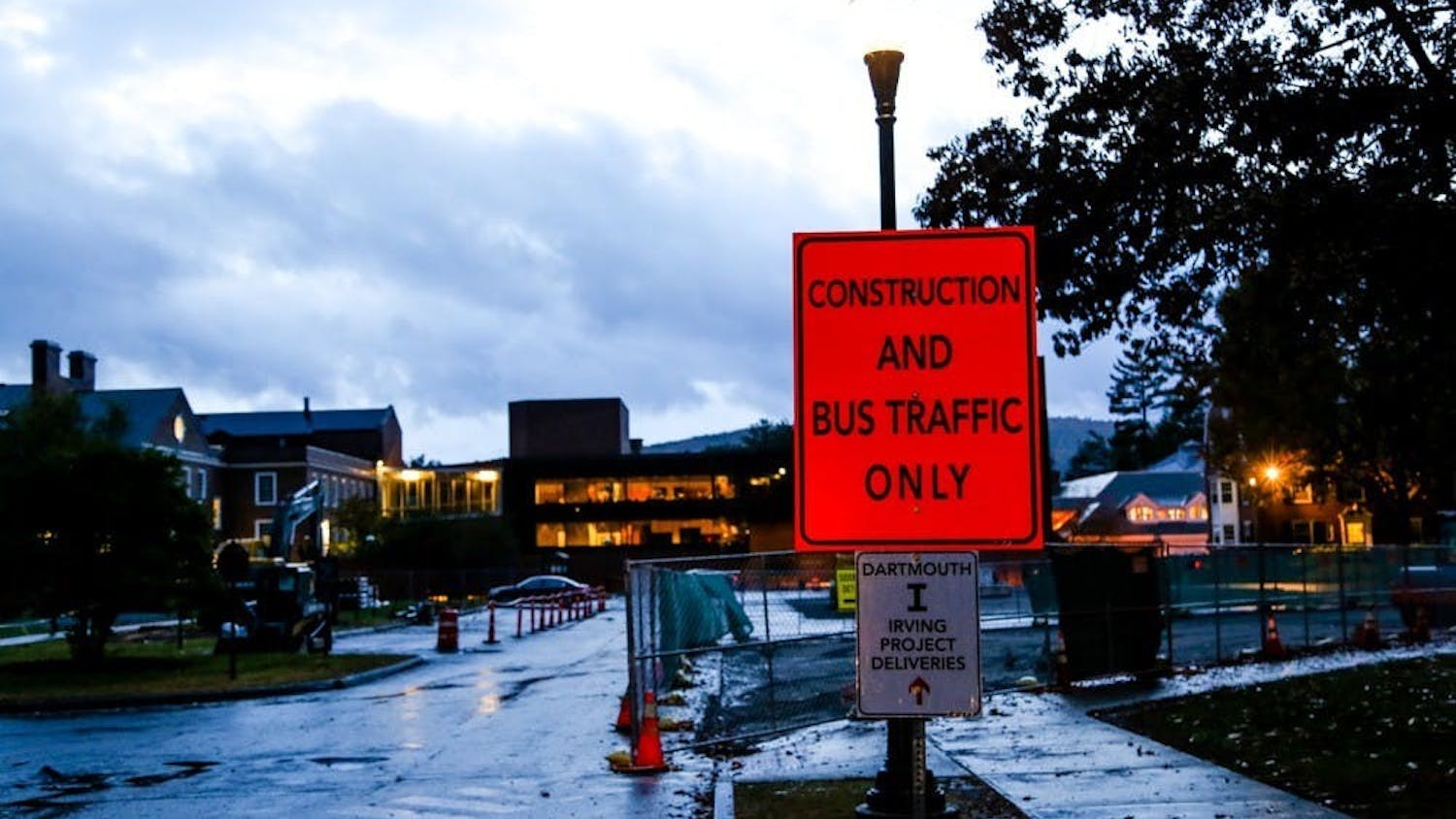Despite the COVID-19 pandemic putting much of campus life on hold, from in-person classes to Ivy League sports, one aspect of the College’s campus operations has been moving full-steam ahead even amidst the pandemic: construction.
Two new buildings will soon reshape the landscape of the west end of campus: the Irving Institute for Energy and Society and the new Center for Engineering and Computer Science. Additionally, on historic Dartmouth Row, two buildings — Dartmouth Hall and Thornton Hall — are undergoing renovations. Across the street, the Hopkins Center for the Arts is slated to begin renovations at the end of next year.
During the building process, every project team has had to adhere to Dartmouth’s High Performance Building Energy Policy, which has set sustainability and energy usage guidelines for all College construction since 2016.
Among other goals, these guidelines stipulate that all new projects that cost over $10 million must target LEED certification, a green building certification program first developed in the 1990s by Robert Watson ’84. There are four levels of LEED certification — certified, silver, gold and platinum, with platinum being the most rigorous and environmentally conscious. The Irving Institute is expected to achieve LEED Platinum certification, while the Center for Engineering and Computer Science is expected to achieve LEED Gold — the second-highest level — after finishing construction.
According to campus services director of communications Lisa Celone, sustainability concerns were considered through all steps of the building process.
“[The projects] all have integrated design, which means that when we’re in the beginning stages of designing a new structure, a new project, everyone is at the table early on, all talking to each other so that every area is well-coordinated,” Celone said.
The new Irving Institute building has an energy usage design goal of 20 kBtu per square foot per year, according to Celone, which translates to 85% less energy use per square foot than the average building on campus.
According to managing director of research at the Irving Institute Stephen Doig, the building compares well to other buildings even beyond Hanover.
“Compared to the best-in-class in the world, it’s certainly at the very, very top as a design goal,” Doig said of the building’s targets for energy usage. “I think it will deliver [20 kBtu per square foot per year] as well, so that’s a huge step forward in terms of building buildings that will last for a long time and sip energy rather than gulp it.”
According to architectural documents outlining the Irving Institute’s design objectives provided by Celone, the Institute plans on achieving these goals with a variety of environmentally-friendly features, including a natural ventilation system that will automatically bring in air from outside in order to cool and warm the building when needed, minimizing the need for mechanical cooling or heating methods such as air conditioning or combustion. In addition to a skylight, the roof will contain solar panels.
Sustainable design has also been central to the new Center for Engineering and Computer Science, according to an architectural document outlining the center’s sustainability features provided by Celone. The building will include improved ventilation techniques and the ability to capture the heat exhaust from laboratories. The new building, which will house the Computer Science department, the Magnuson Center for Entrepreneurship and a significant expansion of the Thayer School of Engineering, will target a LEED Gold certification, the second-highest level.
As Celone pointed out, the guidelines laid out in the High Performance Building Energy Policy apply to both new buildings and renovations on existing buildings, meaning that green processes have been a consideration for Dartmouth and Thornton Halls — as well as Reed Hall, for which renovations were completed last year.
“One of the ways that we’re sustainable is that we’re actually reusing the buildings,” Celone said. “When possible, we don’t take the buildings down completely; we keep and reuse the structures — the bones — of them.”
The renovations of Reed and Thornton Halls have incorporated some sustainable elements in an attempt to modernize the centuries-old structures, including low-temperature hot water systems that will reduce greenhouse gas emissions substantially.
According to Sustainability Office program manager Marcus Welker, the Dartmouth Hall renovations also involve replacing the building’s entire insulation system, despite the cost of such a task being higher than the College would usually undertake.
“Normally, the College uses a relatively short payback period for those types of projects,” Welker said. “Somewhere in the order of five to ten years, the College likes to see the savings generated from those efficiency projects pay for the project.”
In the case of Dartmouth Hall, the payback period — the time it will take for the renovations to pay for themselves through savings due to lower energy costs — for the insulation will be “much longer.” Despite this, the College is moving ahead with the scheduled insulation replacement to ensure that the renovation is long-lasting.
Once completed, Celone expects these new structures to shape the College’s landscape for decades to come.
“We do plan to build new buildings to last 100 years, which is pretty amazing,” Celone said. “We try to construct such high-performance buildings so that they will last a long, long time.”




